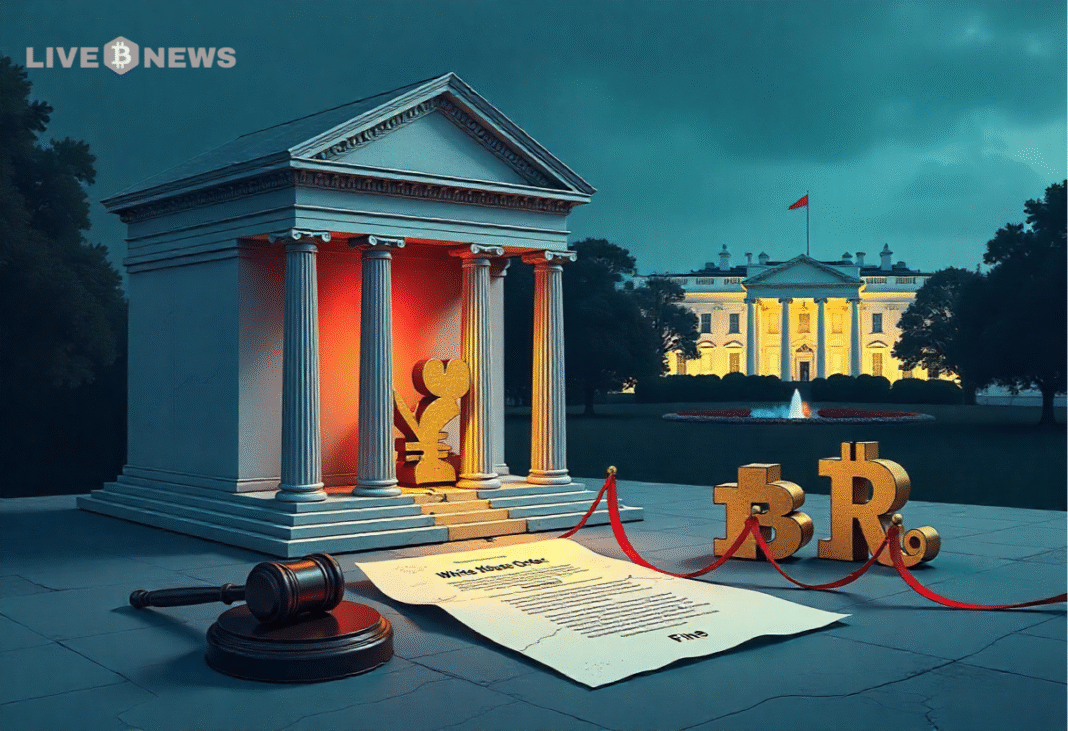- Banks face fines for politically based account closures.
- ChokePoint 3.0 raises fees, blocking consumer access to crypto.
- DOJ authorised to probe discriminatory banking
The federal government is preparing to punish financial institutions that prevent crypto businesses from accessing banking services. There is a draft executive order targeting financial institutions suspected of political or ideological discrimination against crypto businesses.
This is done after conservative groups and startups complained that they were being discriminated against in getting banking services.
According to the Wall Street Journal, regulators would probe alleged lawbreaking, such as the Equal Credit Opportunity Act and antitrust laws. Enforcement actions and heavy fines may be imposed on banks that are convicted.
This raid will eliminate the so-called de-banking trend, according to which banks refuse to work with crypto clients, depriving them of the necessary financial services. The question has caused controversies over fair treatment in the financial markets and the increasing role of politics in the decision-making process in banks.
The Rise and Fall of “Operation ChokePoint 2.0”
Opposition to crypto de-banking is linked to the controversial federal operation “Operation ChokePoint 2.0.” During the Biden administration, authorities forced banks to drop crypto businesses, strangling development.
The banking sector is now heading to ChokePoint 3.0, which applies high fees and selective blockages of crypto and fintech apps as a means of stifling competition. As Alex Rampell of Andreessen Horowitz outlined, this new strategy means levying unreasonably high fees on fintech and crypto applications, or simply blocking them, removing consumer choice and market competition.
Rampell cautioned that in case the megabanks manage to achieve this strategy, other banks will do the same. This may compel consumers to pay high prices to transfer their funds into crypto or fintech systems or resort to lower-quality financial solutions offered by conventional banks.
Why Are Banks Cutting Crypto Clients?
Banks use the anti-money laundering (AML) issue and enhanced regulatory oversight of crypto transactions as reasons to shut down accounts and limit their usage. They hold that adherence to these regulations is expensive and complicated.
Nevertheless, critics say that these arguments are excuses for ideological prejudice or political intentions of the crypto businesses. Other cases of de-banking include financial discrimination against groups on the basis of their political affiliations.
The draft executive order would also consider the policy of loan guarantees affecting crypto startups and conservative nonprofits. It also empowers regulators to a higher degree to investigate banking discrimination.
The violations would be sent directly to the Department of Justice, which recently established a task force to crack down on biased de-banking practices.
A New Regulatory Wave Hits Crypto Banking
This White House action might change the relations between banks with crypto companies. A new approach would be a sharp change of policy on federal enforcement against discriminatory de-banking.
In the meantime, critics are raising alarm about what they call ChokePoint 3.0, as banks charge high rates to move money in or out of accounts through crypto and fintech apps. They regard this move as a method to stifle competition and restrict consumer choice in finance.
The crypto sector anticipates additional regulatory changes after the enactment of laws such as the GENIUS Act, which establishes clear regulatory frameworks for stablecoins and digital asset markets.
Regulators are pressuring banks to consider fair access and regulation. The non-compliance to the new order may cost the lenders millions of dollars and a restructuring of the crypto-finance ecosystem.





